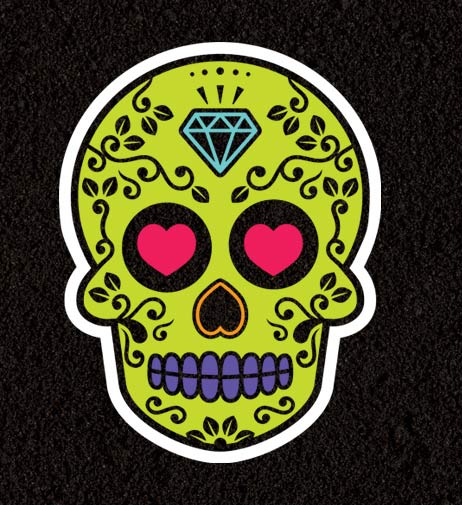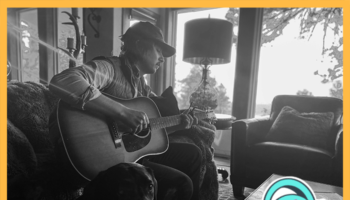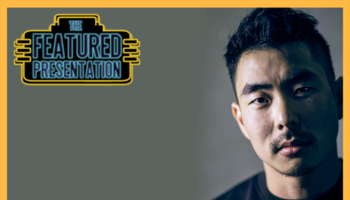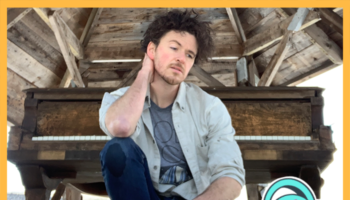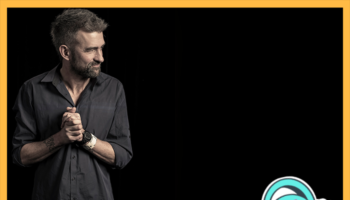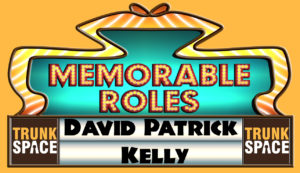
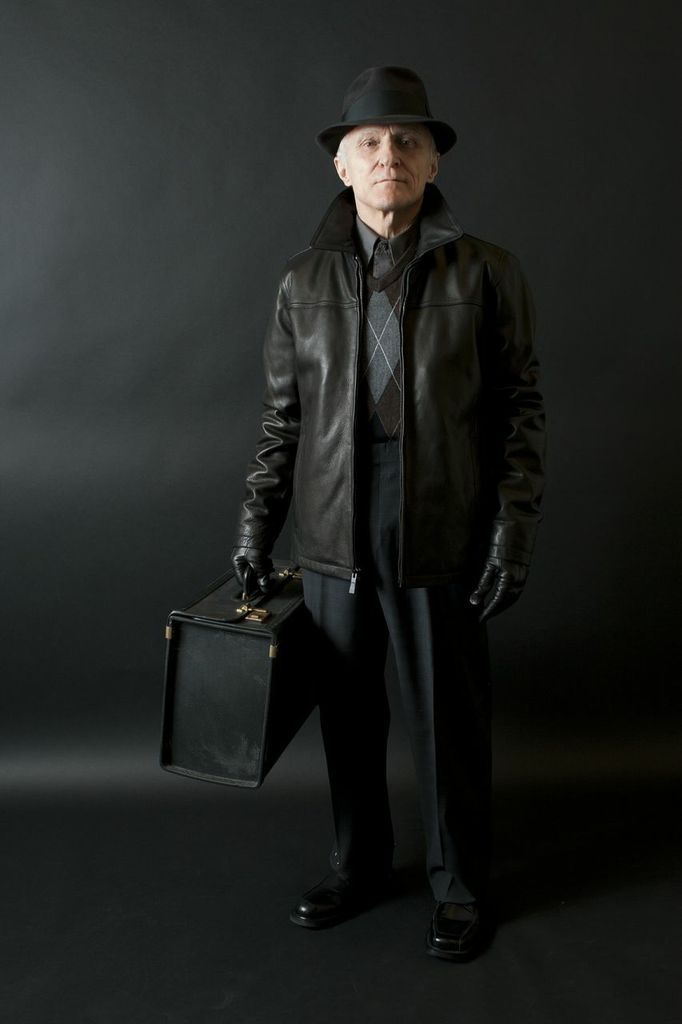
When it comes to memorable roles, David Patrick Kelly has had his share. As fans of pop culture, we’ve admired his work and influential career for years, from his role as Luther in “The Warriors,” to the villainous slimeball Sully in “Commando,” and all the way through to the equally-villainous slimeball T-Bird in “The Crow.”
Thankfully, in real life, Kelly doesn’t have an ounce of slime to him. TrunkSpace had an opportunity to sit down with the actor to discuss his career, the return of Charlie, professional cleaner to hitmen everywhere, in “John Wick: Chapter 2,” and the looming arrival of his character Jerry Horne in the upcoming revamp of David Lynch’s “Twin Peaks.”
TrunkSpace: You’re based in New York?
Kelly: Yeah. I’m doing this play (“Everybody”) at the Signature Theatre. It’s a Frank Gehry-designed theater on 42nd Street. It’s a great place. They sort of do whole seasons of one playwright and it’s this guy who just won the MacArthur “Genius Grant,” his name is Branden Jacobs-Jenkins. In the Middle Ages they had these things called mystery plays and they’d do them in the front of the churches to sort of say repent and, you know, think about your life. And so Branden wrote a new version of that.
TrunkSpace: Were those original mystery plays scripted?
Kelly: Yeah. There’s a lot of theories about how they started. It may have been by a bunch of monks back in the day and they’d put on these plays. In a large degree theater started on the front steps of churches where they’d do plays from the Bible and things like that… as little, kinds of, sermonettes.
TrunkSpace: And so “Everybody” revisits that?
Kelly: This one is really hilarious and really funny. We have a unique way that we’re doing it. There’s five actors and we all play all of the parts. Some of the parts are allegories, like stuff or, you know, your mind or strength or beauty. But then the main character is the everyman. That was the original play, “The Everyman” and he changed it to “Everybody.” And so what happens is five us play all of those characters. We memorized the whole script and he (Branden) puts our names on ping pong balls and at the beginning of every show, we don’t know who’s going to play what. And so it’s like this extended metaphor for never knowing when your number is up.
TrunkSpace: That must keep it fresh for you as an actor.
Kelly: Yeah. You’ve got to be ready to go. It’s really something. We’re having a lot of fun and we’re going to be there through March. It’s very cool. I really like the logo. It’s one of my favorites. Not since the colors for The Rogues have I seen such a cool logo.
TrunkSpace: It’s like a Day of the Dead type of thing.
Kelly: Yeah. Exactly! My little daughter… I’m in the old daddy’s club and I have an eight-year-old daughter, my first and only child… and she dressed up as a, they call them, La Calavera Catrina. They’re these elegant kind of skeleton type people from Day of the Dead.
So, it’s a cool logo. On the original patch for “The Warriors” movie, there was an amazing seamstress and she did all of the patches for “The Warriors.” We all had our individual colors and on the back was the Rogues and the Rogues was a skull. And she was this master seamstress from England and she worked for a guy named Nudie Cohn. And so Bobby Mannix, the costume designer for “The Warriors,” got this lady to do all of the different patches for the gangs. And, Nudie was the guy who made Elvis’ gold lamé suit. And then everybody… all the rockers after Elvis, they all wanted things from Nudie. But he’s a fascinating character and that story goes on and on, but this lady was famous for doing all of the work for all of the country western singers. If you see those fancy suits that they wear… Gram Parsons and all of those folks… and she did it all. Some lady from England who ended up working in LA there for Nudie.
TrunkSpace: What’s crazy about those patches is that you can still see them to this day on T-shirts worn by teenagers and 20-somethings.
Kelly: I was on the subway a couple of days ago and people had the T-shirts. I see those T-shirts all the time. I also saw somebody who had something from “The Crow.” They had all the lyrics from “It Can’t Rain All the Time” on the back of it.
TrunkSpace: You mention lyrics. You’re a musician yourself, aren’t you?
Kelly: I’m a lifelong musician. That’s been parallel with my acting career. I’ve done a few musicals over the years… the last one was an Irish musical that the Irish people in Boston know well because we started there at the A.R.T. “Once,” based on the movie “Once.” And I did that for four years. But, I have a real good group of musicians who play with me and I’m doing this cabaret show, which is songs from all of the movies and plays and things that I’ve done. And so we do some from “The Warriors,” like Joe Walsh’s “In the City,” but it’s all kind of bluegrass newgrass style. I play the mandolin and my friends play the cello and the violin.
TrunkSpace: So it’s a three-piece?
Kelly: My core is just three people. They’re all people that were in “Once.” Incredible actors and musicians. That’s the way we’ve been doing it. We do things like “Nowhere to Run,” from “The Warriors,” and “Burn” by “The Cure,” and “It Can’t Rain All the Time” from “The Crow.” A few things from “Once” and James Taylor’s song from a show that started my career in a sense called “Working,” which James Taylor wrote the songs for. “Millworker.” You can hear Eddie Vedder and Springsteen do covers of that. Great song.
TrunkSpace: How deep do your musical roots go?
Kelly: I always played music and acted. I was actually a part of the CBGB’s scene back in the 70s. Because I could play, that’s how I got in the show “Working.”
TrunkSpace: So was music and acting always part of the plan professionally?
Kelly: Always parallel. They were always intertwined. Actor/musicians are a time honored thing. It goes down for the ages. James Cagney… my cat is named for Cagney. The light from this window is in East Harlem where I live and Cagney was born around here. He had that famous catchphrase, “You dirty rats… you dirty rats!” So I thought that would be a good name for a cat.
TrunkSpace: Especially in the city, right?
Kelly: It toughens you up! My little daughter, she’s seen rats on the subway.
But, it’s always been intertwined. If you go through Shakespeare, I played Iago about 10 years ago, and Iago sings songs because he gets Cassio drunk and gets him in trouble. But, he sings a couple of songs, and to do that I went to this amazing shop on Staten Island called the Mandolin Brothers and I bought a chrome ukelele because I was listening to Wilco at the time and he had a song that said, “The Devil is not red, it’s chrome.” And so, this beautiful ukelele is a National, beautiful aluminum ukelele, so that’s what I used as Iago to sing.
And on and on. All through Shakespeare there are songs and singing and many, many of the actors who I have admired have always been actor/musicians as well. There was a great old vaudevillian African American named Bert Williams and he wrote all of his songs. Cagney played. I actually went to an auction of Cagney’s stuff after he died. It was just a few blocks down. And he had these beautiful Martin guitars and they had photos of him playing those. So you didn’t think of Cagney really as a musician. And actors, the more things you can do the better. I’ve done every kind of genre that there is. I’ve done Greek tragedies. I’ve done American musical theatre. I’ve done cabaret stuff. I’ve done straight up drama. Chekhov, Shakespeare. And that’s always what I wanted, really. That was the whole dream to try and do everything that an actor could do and it’s worked out real well.
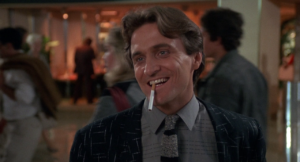
TrunkSpace: Is there a separation for you in terms of your work on stage and your work in film/television? Do you have more passion for one over another?
Kelly: If you’re doing a great role on stage like Iago that I played, there’s nothing like it. It’s like an Olympic event because you’re set free. You rehearse and you do what the director wants and all that kind of stuff, but as an artist you really get to be there with the audience. It’s like a rock n’ roll show. So, the theater sort of sets you free. I love movies because it’s just a different thing. You do less, less, less. You just have to be photographed. It’s like recording music or performing it live… you’ve got to project it more when you’re performing it live. And then when you record it, Pete Townshend or the guys in Pearl Jam will tell you, if you saw that documentary with Edge and Jimmy Page and Jack White called “It Might Get Loud,” they show you. You just barely touch it, but it’s all about the volume. So those are the kind of techniques that you use and it’s very similar to stage versus film. You can’t do too much in film. You just got to allow the camera to come to you rather than you going out to the audience.
TrunkSpace: You mention not doing too much in film and that sort of brings us to your character Charlie in “John Wick.” He’s so subtle. So understated.
Kelly: I really enjoyed the way that worked out. Chad Stahelski and David Leitch, who directed the first one and Chad does the second one by himself, but they both work on all of the choreography because that’s where they came from. It was so great because every fine artist that I’ve worked for kind of schools me in some sense. For those guys, as stunt coordinators, they have hung around for so long on sets, they’re really the workhorses of those things. They have to be there all the time. And they love making movies and so they’re really students… in the same way that Quentin Tarantino and Martin Scorsese know every encyclopedic thing about movies, cameramen, techniques… they know it as well, but it’s a different genre. Their passion is for action movies.
TrunkSpace: And being students of that genre, they know what hasn’t been seen before and can introduce it in new ways.
Kelly: Yeah, and because they’ve been around designing things like “The Matrix” and “300” or anything like that, they know what maybe they didn’t get on the last one and that they want to go further with. And also the stripped down nature of “John Wick”… the fact that it’s really just all on the stunt guys. It’s really not special effects. It’s nothing else. It’s really these guys knowing what they know how to do, and so that’s a wonderful contribution, that it’s just them. It’s really like the kind of theater that you see that uses no big sets and is really just about the actors. That’s a similar thing. It really focuses on their craft. But they also love the story, which is just a simple elemental story, but who can’t relate to that? Everybody can. So that’s why it was a surprise hit, I think.
And Charlie is fascinating. There’s this movie called “Point Blank” with Lee Marvin and that was what they modeled “John Wick” on, because it is really simple. The language is simple, but the story locks you in so you’re kind of really riveted with the story. And Charlie, I got to talk to the guys from that business… from the cleaning business. There’s a company from Chicago called Aftermath.
TrunkSpace: There’s one here where we are as well.
Kelly: Oh, really? They sent me a boatload of stuff. The T-shirt and the bags that they sent me say, “Specialists in crime and trauma scene cleanup.”
TrunkSpace: It takes a particular mindset and focus to do that kind of job day in and day out.
Kelly: Yeah. There’s a lot of attrition because the owners don’t really do all of the on site stuff, but there’s a big turnover in those people because it’s very difficult to deal with people in that situation… the horrible tragedies.
TrunkSpace: You probably never know what you’re walking into until you get there. It’s probably tough to digest every day.
Kelly: I almost went out with them, but then they said, “You know, it’s a lot of blood work, and you never know what kind of blood you’re getting into.” So, I thought it would be better to stay away from that and just read the books and talk to the people.
But, Charlie is also kind of mythical. Without trying too hard, with “John Wick,” they made these characters really mythical. The hotel clerk. The other hitmen.
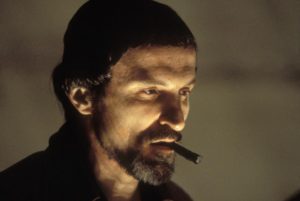
TrunkSpace: And the cop who comes to the door and just accepts that John is working again.
Kelly: (Laughter) Yeah. To have folks like me, who carry a lot of baggage of different stuff, it kind of lends that aura to it as well. I’m a long time martial arts guy myself, so I went in to meet them and I showed them my best move. I think that sold it. I was kind of in the club there for a minute.
TrunkSpace: Does Charlie have any sort of arc in this one or is he back exclusively cleaning up after John like he did in the first one?
Kelly: Similar. But, they’re working on the third one and they told me they’re really going to look for a place for my karate move that I showed them in that first meeting. (Laughter)
TrunkSpace: What’s interesting about your various memorable roles is that they’re also generational. One audience may connect with “The Warriors.” Another will connect with “The Crow.” What’s been your approach to achieving such career longevity and picking projects with such relevance?
Kelly: You sort of try to stick with what you love. It’s always been music and art and theater and film. And I’ve been doing that since I was just in high school. I was making little movies and composing songs and being in a band and loving literature. I read Beckett and George Bernard Shaw in high school and I just loved the way the script looked on the page. The way it was laid out was so mysterious and so great. I talk a lot about the Catholic church, about being an alter boy in the 50s and having to learn Latin. There was a whole mystery and incredible stuff to that. And then to read James Joyce and to see him quoting the same things in there… this love of literature, which came from my parents, is something that inspired me. I didn’t really consciously think about being an actor. I just did these things all through high school. I didn’t even really get any good parts in the high school plays. A couple that were formative, but… J.M. Barrie who wrote “Peter Pan” wrote a great play called “The Admirable Crichton”… and it just came to me, only recently, that that was probably the thing that made me think this was possible. There was this really great part in there of an English gentry guy and it’s a little bit like “Gilligan’s Island” or “Upstairs, Downstairs.” What happens is that the rich people shipwreck on an island and the servants all are capable and the rich people are not. And, J.M. Barrie, that was his thing back then. But there was this funny part in there and it kind of really got over to the audience and I think that really had an effect on me that I didn’t realize. And then when I got to college I started getting cast immediately and it sort of took over my studies and I got scholarships and everything else, so that’s when it sort of happened. Then I came to NY in 1973.
I went to study in Paris when I was still in college. I studied with Marcel Marceau and that was a huge thing because being in Paris when you’re 19 and studying all of this stuff about theater was incredible. It was an incredible time for theater. It was when all of the clown people like Bill Irwin and the early Saturday Night Live people were starting out…
TrunkSpace: And miming gets a bad wrap, but that is tough to convey and pull off.
Kelly: That’s right, man. Mimes do get a bad wrap, but it’s an incredible skill. Everything from that “Warriors” bottle chant… on and on… little subtle things, it all comes from that sort of inventing 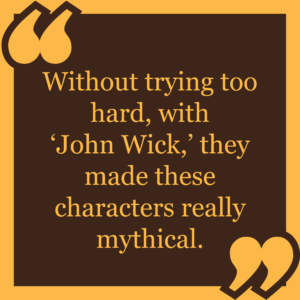 something out of nothing. It was such an incredible time. We’d go to the Cinémathèque over there and I’d see all of this stuff. I got into French Theory. There was a great actors named Antonin Artaud, and he was part of the surrealist movement and he had a list of what should be theater and I’ve tried to follow that list and I’ve checked things off all the way.
something out of nothing. It was such an incredible time. We’d go to the Cinémathèque over there and I’d see all of this stuff. I got into French Theory. There was a great actors named Antonin Artaud, and he was part of the surrealist movement and he had a list of what should be theater and I’ve tried to follow that list and I’ve checked things off all the way.
And then coming to New York and working with the avant-garde here. Richard Foreman, is sort of our American Samuel Beckett. He won that Genius grant too. He’s been knighted by the French. Working in that kind of inventiveness and the CBGBs movement, that led right into the breakthrough in “The Warriors” and then on into David Lynch and all that kind of stuff. I think it all comes from that… sort of in a nonstop, one thing to another.
TrunkSpace: You mentioned David Lynch, which brings us to “Twin Peaks,” which is due back soon, much to the delight of fans. You got involved in that project inadvertently through working on “The Adventures of Ford Fairlane,” correct?
Kelly: That got me into David Lynch. I was working on that character and I brought this prop that I had… a suitcase shrine to the women that I was stalking… and I went to the meeting with Lynch and he said, “That’s great.” And then he wrote me into “Wild at Heart” and then he wrote me into “Twin Peaks.”
TrunkSpace: And you’re back in the new series, correct?
Kelly: That’s correct. We’re doing the new one and it was great. He was on fire. He did every episode. He directed the whole thing like a 40 hour movie or something like that. So it’s really something. It’s just like the original one. Going back 25 years later, what a trip.
TrunkSpace: As an actor, it must be incredible to return to a character after that much time. Do you have to put your head into the mindset of that character in order to figure out what his off-camera journey has been for those 25 years?
Kelly: Well, the best thing that happened was that I got to finish the books that I was reading originally. (Laughter) One was Thomas Pynchon’s “Vineland.” That was what I originally based Jerry Horne on… sections of that. Ayn Rand’s “Atlas Shrugged.” I got to work on that. But that was a fun thing because Pynchon was a big influence for me on that and Ayn Rand because Jerry Horne… I think our current president is the fulfillment of what the Horne brothers were trying to do. Ben was running for the senate in the original version of it, but I always thought… Lynch kind of represents this division between the 50s, this kind of fake, controlled atmosphere that was around, and then the craziness of the 60s. All derogated from Kennedy’s assassination. And I think that’s a symbolic thing that’s happening. This is all my opinion. In “Wild at Heart,” there’s a lot of symbolism in that and it’s the same thing in “Twin Peaks.” There’s this kind of 50s, from the opening music to the girls in their bobby socks and plaid skirts, to this craziness of the unleashed 60s… this kind of insanity that happens after a major crime. And so the Hornes, everything from Jerry’s haircut where he had the close cut sides and this kind of virtue of selfishness, which is one of Ayn Rand’s principals. She had a book entitled that in fact, “The Virtue of Selfishness.” And that’s kind of what he represented.
And what I said about “Twin Peaks” was that, we based that on a National Enquirer version of the Kennedy brothers. If you believed everything bad that you ever read, and I’m an old Kennedy democrat. I saw John Kennedy speak. I saw Robert Kennedy speak. That’s my political side. But, we based it on a version if you believed everything bad you ever read about them in the National Enquirer… that’s who the Horne brothers were.
So the satisfying part of going back 25 years later was to sort of see what happened and finish those original research books and carry through that whole inspiration, which was just an unusual thing in a career to be able to do that.
TrunkSpace: And as far as changing the landscape of television, that show was such an inspiration to so many series to come, especially in cable.
Kelly: David Chase from “The Sopranos” said that “Twin Peaks” was the thing that sort of created this whole new era. With his “Sopranos,” he said he wanted to be “Twin Peaks” to New Jersey. So, it was really unusual. It was one of those things where it was just bigger than everybody… even Lynch himself. I think it took him by storm. I’m so happy he could fulfill that whole thing and make it a complete thing. The fans kept it alive really, so I’m thankful to them.
If you’re in New York, be sure to check out Kelly in “Everybody” at the Signature Theatre Company on 42st Street. Click the image below to buy tickets.


